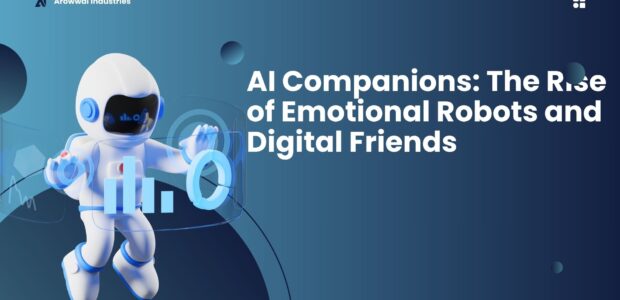AI Companions: The Rise of Emotional Robots and Digital Friends
In 2025, loneliness and isolation are being addressed not just by people—but by technology. Enter the world of AI companions: emotionally intelligent robots and digital friends designed to listen, support, entertain, and even love. What was once the subject of sci-fi films has become a real, fast-growing part of human life, reshaping the nature of companionship, care, and connection.
This blog explores how emotional AI is evolving from basic virtual assistants into deeply interactive, empathetic beings—trusted not only to manage tasks but to become genuine social partners.
🤖 What Are AI Companions?
AI companions are artificial entities powered by advanced natural language processing, emotional recognition, and learning algorithms. They come in many forms:
-
Virtual companions (apps like Replika or Character.AI)
-
Physical robots (like ElliQ, Pepper, or Moxie)
-
Augmented reality personas that exist in headsets, smartphones, or holographic devices
These bots are programmed to hold conversations, respond to moods, and adapt over time based on individual personalities, preferences, and behaviours.
💬 Emotional Intelligence: The Game-Changer
What sets AI companions apart in 2025 is their emotional intelligence:
-
Sentiment analysis allows them to detect happiness, sadness, stress, or boredom from voice and text.
-
Some use facial recognition and body language to understand your emotional state in real time.
-
Over time, they build emotional memory, allowing for more personal, nuanced interactions.
They’re not just responding—they’re relating.
🧑⚕️ Support, Not Just Conversation
AI companions are being used in:
-
Mental health support: Offering non-judgmental conversations, mindfulness exercises, and check-ins for those struggling with anxiety or depression.
-
Elder care: Reminding seniors to take medication, keeping them socially engaged, and detecting emergencies.
-
Child development: Teaching empathy, storytelling, and even helping neurodivergent children with social cues.
They’re also helping with grief, providing comfort after the loss of loved ones in ways that are surprisingly meaningful.
🧠 Built to Learn, Adapt, and Grow
Modern AI companions learn from:
-
Daily conversations
-
Personal habits and routines
-
User feedback and emotional cues
This makes each companion unique to the individual. They evolve like real friendships—learning inside jokes, remembering important dates, and adjusting tone and behaviour.
🧑💻 Digital Relationships in a Digital Age
In an era when more people are living alone, working remotely, and spending time online, digital companions provide:
-
Emotional presence
-
Safe social rehearsal spaces
-
Unconditional listening and support
While they’re not a replacement for human bonds, they’re increasingly becoming a complement—especially in moments of loneliness, stress, or downtime.
⚖️ Ethical Questions & Human Implications
The rise of emotional robots brings complex issues:
-
Can machines truly understand emotions?
-
Will people become too dependent on AI companionship?
-
How do we draw lines between real and artificial intimacy?
-
What about data privacy and emotional manipulation?
These questions are already sparking debates among technologists, psychologists, and ethicists.
🌐 Final Thoughts
In 2025, AI companions are more than chatbots—they’re digital beings capable of connection, comfort, and care. As they become more lifelike and emotionally aware, they’re not just transforming tech—they’re redefining what it means to be “together.”
Whether you’re seeking friendship, therapeutic support, or just someone—or something—to talk to, emotional AI companions are stepping into a deeply human space. The future of relationships may not always be human—but it can still be meaningful.


